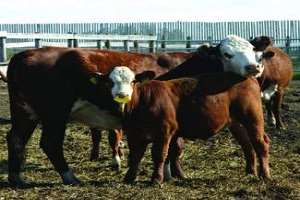Ensuring your calves are healthy, by reducing stress, will improve their performance in the feedlot and improve your relationship with your buyers.

As the fall of the year is upon us, I reread one of my favorite Baxter Black poems, “The Fall Run”. Dr. Black writes a line in that poem that states: “Every cowboy rode and doctored, hardly getting’ time to rest. You can bet we earned our wages, kissed our one day off goodbye, working 6 o’clock ‘til midnight, eatin’ supper on the fly.” As much as I can appreciate the humor and reality in Dr. Black’s poetry, it is unfortunate that, as we get ready to wean and bring calves in to sale barns or feedlots, this scene painted is sometimes the expected norm. There are a number of measures that we can take to ensure our calves get started correctly and do not come in sick and begging for the Draxxin.
One of the first things we can do to ensure cattle enter a sale, or our own feedlots, with the ability to fight off disease, is reduce stress. Whether it is stress on a load of purchased calves coming in or stress those calves that went through on our own farms, increased stress equals increased incidence of illness.
For most of the industry, weaning is often the first big stress in a calf’s life. Unfortunately, for much of the industry the time of weaning is also coupled with initial immunizations, castration, and shipping. Each of these events represents an additional stress. Spreading out the stressors during this critical transition period in a calf’s life can mean the difference between an easy transition, that calves can continue to gain weight through, and a train wreck.
One way to reduce stress on calves is to consider earlier vaccinations and castration. While, yes, it means working the calves one more time, it also means a better response to the vaccine and a quicker healing time because they can go back out on clean pastures with mom. She will dote on him and care for him and he’ll be back in a familiar environment. All things that will reduce stress. Another option to reduce stress is to 2-stage wean your calves.
Two-stage weaning can be done a number of different ways. Two that have proven success are fence-line weaning and using nosers or nose-flaps. If you choose to fence-line wean, be sure you have the appropriate area to do so in. Fence-line weaning involves sorting off the calves from the cows; yet, keeping the cow and calf groups in adjacent pastures or pens. In this scenario, the calf is physically removed from the cow but can still see, hear, and have nose-to-nose contact with the cow. The second weaning strategy employs the use of nose-flaps. These little plastic flaps are inserted in the nose of calves when producers are ready to wean. Calves are then turned back out with their mothers for 4 to 7 days. The noser prevents the calf from suckling while he is still with the dam, thus removing milk without removing mom at the same time. At the end of this period, nosers are removed and calves are sorted off on to the truck or in to the feedlot. This physical contact permitted in both 2-stage weaning processes reduces the amount of time calves spend bawling and searching for the dam through weaning, and afterward in the feedlot.
One option to consider is coupling vaccinations with the use of nosers. In this scenario, the vaccinations and/or castrations are done when you bring calves in to put the nosers in initially. This allows them then the 4 to 7 days to spend back out with the dam to heal and mount an adequate response to the vaccine, while still decreasing the number of times you have to run calves through the chute.
The moral of the story is that stress reduces intake and gains of newly weaned calves. Ensuring your calves are healthy for the best possible start after weaning will not only improve their growth on the home farm; but, if you are marketing them, will potentially improve your relationship with your buyer as well when they know they will get quality calves ready to gain well!
Source: psu.edu